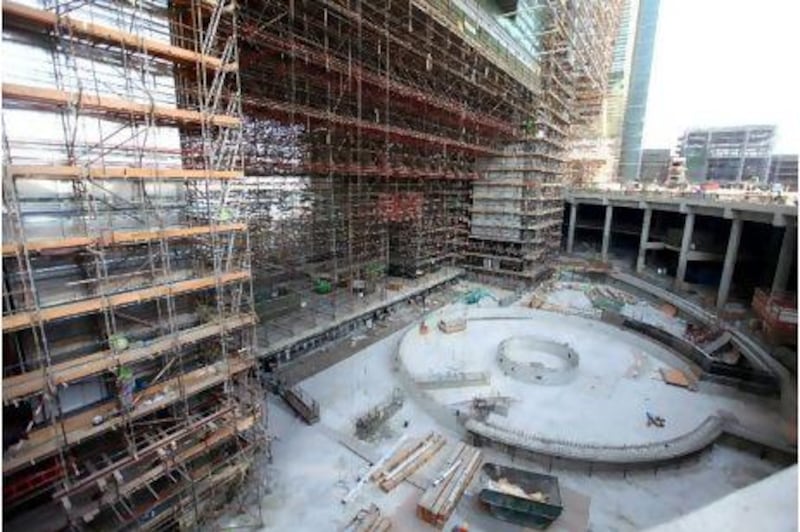The new headquarters of the Abu Dhabi Securities Exchange (ADX) is nearing completion on Sowwah Island, and a recent visit to the site showed the structure would almost certainly make it on to any list of the capital's most visually arresting structures.
Although it is still encased in scaffolding, the four-storey glass structure is suspended more than 25 metres above ground, supported by four granite columns, and will eventually be surrounded by water features that architects say will give the building the appearance of floating.
All told, it boasts more than 21,367 square metres office space, including a trading floor of almost 1,000 sq metres.
It seems fair to wonder what the exchange plans to do with all that space, given the dwindling activity in local markets of late.
On most days in recent months, the number of traders at the ADX in its current Hamdan Street location could fit in a decent-size living room.
The delivery of the new headquarters, tentatively scheduled for May, with trading at the site to begin by August, makes the possibility of a national stock exchange all the more intriguing. ADX's Hamdan Street headquarters is not nearly big enough to house a national bourse, but the new one could probably do so easily.
The timing is certainly auspicious.
The markets story of the past few months has been the shrinking trading volumes and the resulting lack of public offerings. Local markets have long depended on a mix of retail investors and outside fund managers, and both categories have retreated to the sidelines.
Last week, the Securities and Commodities Authority (SCA) seemed to verify that the possibility of a merger of UAE markets was gaining momentum when it released a statement saying its Advisory Board backed the idea and even went as far as to say markets would "witness significant growth" once a merger went through. But within hours, the agency withdrew the statement, citing an error in translation from Arabic into English.
That very well may have been an honest mistake, but it was accepted by many analysts and investors as confirmation that the wheels were in motion for a tie-up.
This is widely seen within the investment community as good news and critical to a rebound for local bourses.
In markets, scale matters. Investors like to put their money in places where they can get in and out of positions quickly and efficiently. With only a handful of stocks in the UAE attracting serious volumes each day, that is increasingly a problem here. As analysts and even officials with the UAE's three bourses have pointed out, the country's publicly listed companies are more likely to attract international attention if they are grouped on a single platform.
By putting the three exchanges together, the UAE would create the second-largest bourse in the Arab world behind the Saudi Tadawul. Also significant is that a unified exchange would be a much more compelling candidate for an upgrade to an emerging market by the influential index provider MSCI. That would then attract even more volume.
The talks about a merger are reportedly going on at the governmental level, which means their substance remains something of a mystery. But most observers believe the sticking points are partly logistical and partly political.
The logistics involve the mechanics of how a unified exchange would work. There would be significant technological challenges to integrate all of the stocks into a single trading platform, but Borse Dubai already owns a big chunk of NASDAQ OMX, the stock-exchange operator that created the technology powering many exchanges around the world. It should not be an insurmountable issue. Regulations that are acceptable to the companies making up the exchange would also have to be agreed on.
The political questions are more delicate. The most controversial, at least among outsiders tracking the issue, is where to base a combined exchange. The Dubai International Financial Centre offers the biggest concentration of investment firms in the country, but Abu Dhabi's new exchange offices show that the capital has ambitions of its own.
There are those who will say, what does it matter? Most stock trades are conducted electronically these days, anyway, so the location of the trading floor is irrelevant.
This is only partly true. The heads of most financial firms will tell you that traders and brokers are most effective when they are continuously sharing information with their peers.
The guy trading from poolside is rarely going to match the knowledge of the guy with a large network of contacts he is able to speak to in person every day.
So maintaining a central location for brokerage offices and a trading floor for retail investors is important, but there is no reason there cannot be one in each emirate.
What is far more important is that foreign investors can evaluate UAE stocks on a common platform, and buy and sell them under a single regulatory structure. To outside investors, those practical effects would be the true achievements of a merger.
Most investors will never set foot in the new ADX offices, no matter how stunning. But it is worth remembering that they would be even more beautiful if they were teeming with busy traders and brokers.
Think you know the business side of Abu Dhabi? Take our quiz for a chance to win brunch.






